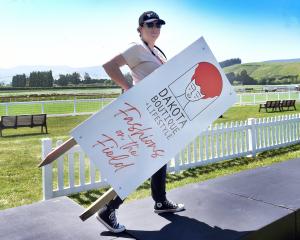
About 35 people staged a silent protest at the University of Otago today over the interim banning of an award-winning book for teens.
The Film and Literature Board of Review placed an interim ban on Ted Dawe's Into the River last week following a complaint from conservative group Family First.
The group objected to certain aspects of the book, including two sex scenes and scenes depicting drug consumption.
The book won top prize in the New Zealand Post Children's Book Awards in 2013.
Dunedin writer and editor Dr Emma Neale organised the peaceful demonstration at The Link in support of the New Zealand author, and in protest of what she said was the violation of "adults' and young adults' democratic right to read [Into the River]".
Dr Neale worked on the early assessment and editing of Into the River and said today's protest highlighted "the absurdity and the injustice of the ban and draw attention to the ridiculous decision to ban it".
The protest action had ''grown'' since the Dunedin event was announced, she said. Similar protests were planned across New Zealand, including in Auckland and Wellington, and overseas.
Having the book for personal use is acceptable under the interim ban. ''You are just not allowed to sell it supply it or distribute it ... it seems outrageously draconian,'' Dr Neale said.
Some protesters who did not own a copy of Into the River planned to read earlier banned books, such as Lady Chatterley's Lover, by D. H. Lawrence.
Into the River contained ''two brief sex scenes'', she said.
''They are contextualised, realistic sex scenes and not designed to excite or titillate. They are a realistic depiction of casual, dissatisfying intimate encounters, which lead the young man to question his own motives.''
The sex scenes were not ''gratuitous or harmful to the public good''.
''It's just social realism.''
Cannabis smoking and the taking of party pills were also included in the book.
Deputy chief censor Nic McCully removed a previous R14 restriction on the book in August, allowing unrestricted sales.
However, Film and Literature Board of Review president Don Mathieson overruled the censor and issued an interim restriction order.
This would remain until the board of review met to discuss the restriction.
Logan Park High School English teacher and New Zealand Spelling Bee Teacher Award winner Lara Liesbeth was deeply concerned about the ban, and the impact it could have on young teens' education.
''It's an unprecedented move that this has happened. It was 22 years ago last time a book was banned.
''For me, the outrage is around a secondary school teacher who is also an incredibly talented writer, who has written a book, that has won awards, that is aimed at a specific audience - and we're talking about an audience that historically does not choose to read, we're talking about teenage boys - and we have one lobby group come forward and say we have an issue with parts of this book ... and it can be taken off shelves and it can be illegal to share with your friends.''
She believed the parts of the book the group had issues with were ''pretty well written''.
''This is New Zealand in the 21st century - it's 2015.
''What are we saying when we start to ban books. It's a sad day.''











